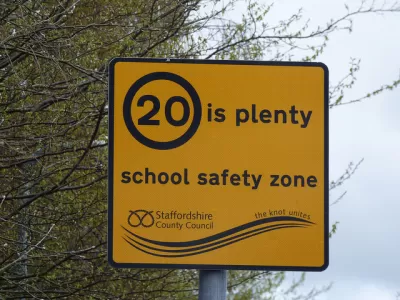It looks very likely that Scotland will take unprecedented action—and global leadership—in the name of traffic safety.

"Scotland is undertaking a remarkable initiative to become the first jurisdiction on the planet to make vehicular speeds a default of 20 miles per hour (32 kph) in any village, town or city," reports Sandy James.
The Member’s Bill going to Scottish parliament has bi-partisan support (across four different parties). Edinburgh, which has already implemented the 20 miles per hour speed in many areas of the city, has seen cyclist and pedestrian injury rates from vehicular crashes decrease by 25 per cent.
The article includes a discussion on the recent history of traffic safety laws and project implementation in Scotland, as well as important details about enforcement of the proposed law.
Hat tip to Angie Schmitt for sharing the post.
FULL STORY: Scotland Looks at Slowing Speed Limits, Saving Lives

Planetizen Federal Action Tracker
A weekly monitor of how Trump’s orders and actions are impacting planners and planning in America.

Maui's Vacation Rental Debate Turns Ugly
Verbal attacks, misinformation campaigns and fistfights plague a high-stakes debate to convert thousands of vacation rentals into long-term housing.

San Francisco Suspends Traffic Calming Amidst Record Deaths
Citing “a challenging fiscal landscape,” the city will cease the program on the heels of 42 traffic deaths, including 24 pedestrians.

Amtrak Rolls Out New Orleans to Alabama “Mardi Gras” Train
The new service will operate morning and evening departures between Mobile and New Orleans.

The Subversive Car-Free Guide to Trump's Great American Road Trip
Car-free ways to access Chicagoland’s best tourist attractions.

San Antonio and Austin are Fusing Into one Massive Megaregion
The region spanning the two central Texas cities is growing fast, posing challenges for local infrastructure and water supplies.
Urban Design for Planners 1: Software Tools
This six-course series explores essential urban design concepts using open source software and equips planners with the tools they need to participate fully in the urban design process.
Planning for Universal Design
Learn the tools for implementing Universal Design in planning regulations.
Heyer Gruel & Associates PA
JM Goldson LLC
Custer County Colorado
City of Camden Redevelopment Agency
City of Astoria
Transportation Research & Education Center (TREC) at Portland State University
Jefferson Parish Government
Camden Redevelopment Agency
City of Claremont




























